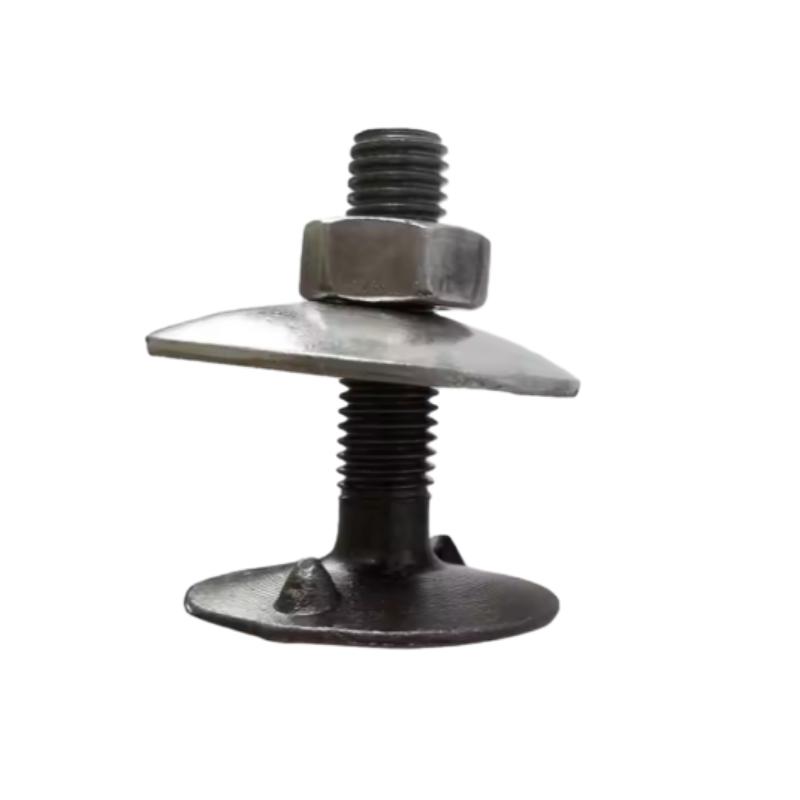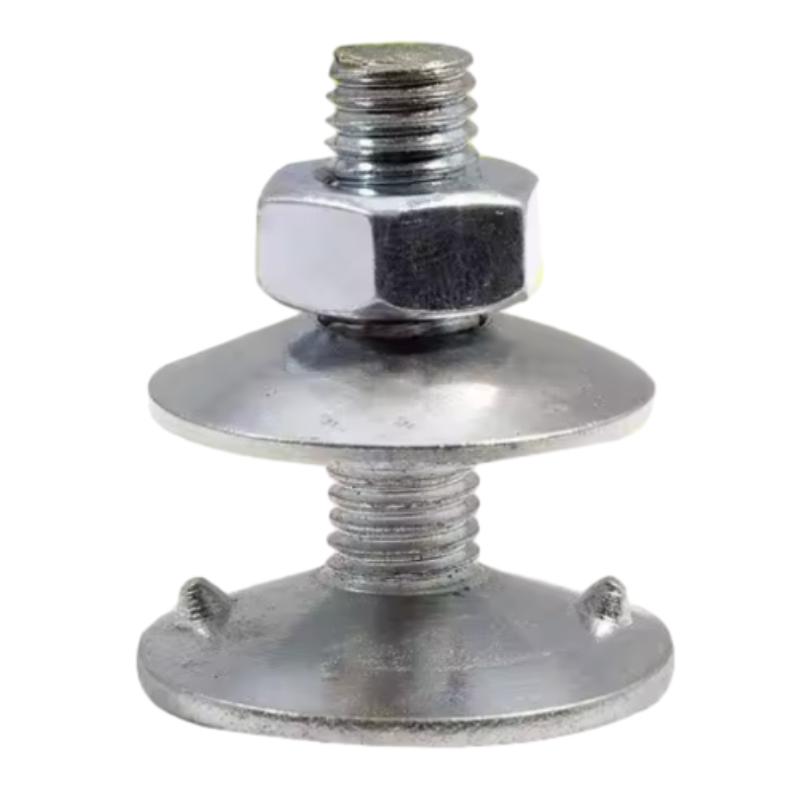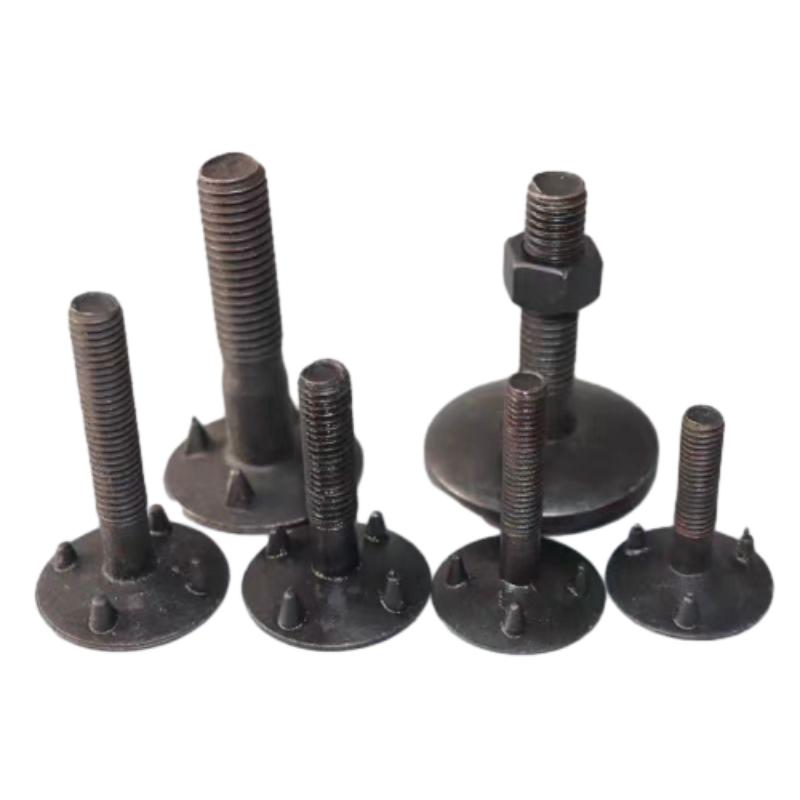

Round Fasteners: Quick Release, Self-Clinching & Reliable Fixings
Ağu . 11, 2025 11:40 Back to list
Round Fasteners: Quick Release, Self-Clinching & Reliable Fixings
Understanding the Evolution of Industrial Fasteners: A Focus on Round Fastener Technology
The industrial landscape's relentless pursuit of efficiency, durability, and safety has consistently driven innovation in fastening technologies. Among the myriad of components essential for structural integrity and operational reliability, round fastener systems stand out for their versatility and robust performance. These critical components, often referred to within the broader category of fixings and fasteners, are integral to various industries, from heavy machinery and automotive to delicate electronics. The demand for fasteners that offer enhanced strength-to-weight ratios, superior corrosion resistance, and simplified installation processes is pushing manufacturers to refine materials and manufacturing techniques. Industry trends indicate a significant shift towards high-performance alloys and advanced surface treatments, responding to increasingly stringent application demands and environmental regulations.
Modern applications require fasteners capable of withstanding extreme conditions, including high temperatures, aggressive chemical environments, and significant vibrational loads. This necessity underscores the importance of precision engineering in the production of every round fastener. The market is also witnessing a growing emphasis on specialized fasteners, such as quick release bumper fasteners and quick release fasteners, which offer rapid assembly and disassembly without compromising structural integrity. This segment addresses the need for faster maintenance cycles and modular design capabilities. Furthermore, the integration of smart technologies, like sensors embedded in fasteners for real-time tension monitoring, is emerging as a critical trend, promising a new era of proactive maintenance and enhanced safety protocols across various sectors.
The Precision Behind Every Round Fastener: Manufacturing Process Explained
The manufacturing of a high-quality round fastener is a meticulous process that begins with the careful selection of raw materials, typically high-grade carbon steel, stainless steel (e.g., 304, 316), or specialized alloys like titanium and Inconel, chosen for their specific mechanical properties and corrosion resistance. The journey from raw material to finished product involves several critical stages, each contributing to the fastener's ultimate performance and reliability. Common manufacturing processes include cold heading, hot forging, and increasingly, precision CNC machining for highly specialized or complex designs. Cold heading, a process where wire is forced into dies at room temperature, is widely used for producing high volumes of standard fasteners due to its efficiency and ability to enhance material strength through work hardening.
Following initial forming, processes such as threading (roll threading often preferred for superior strength), heat treatment (e.g., quenching and tempering to achieve desired hardness and ductility), and surface finishing (e.g., zinc plating, galvanization, nickel plating, or specialized coatings like Xylan for enhanced corrosion resistance) are applied. Each step is rigorously controlled to meet stringent international standards such as ISO 9001, ASTM, ANSI, and DIN, ensuring product consistency and reliability. For instance, the ISO 898-1 standard for mechanical properties of fasteners made of carbon steel and alloy steel is a common benchmark. This meticulous approach guarantees an extended service life, often exceeding decades in ideal conditions, and optimal performance in demanding environments.

In industries like petrochemical, metallurgy, and water supply/drainage, where exposure to corrosive elements, high pressures, and extreme temperatures is common, the precise engineering of a round fastener is paramount. For example, in petrochemical plants, stainless steel fasteners with specialized coatings offer superior resistance to sulfide stress cracking, contributing to plant safety and reducing maintenance downtime. In water treatment facilities, brass or composite fasteners may be preferred for their excellent resistance to aqueous corrosion. The design and material choice for each round fastener are thus optimized to deliver specific advantages, such as energy savings through reduced friction in rotating assemblies or enhanced anti-corrosion properties that significantly extend the lifespan of critical infrastructure components.
Technical Parameters and Performance Data for Round Fasteners
The performance of a round fastener is quantified by a range of technical parameters, which are crucial for engineers and designers when selecting the appropriate component for a specific application. These parameters include tensile strength, yield strength, hardness, torque resistance, and fatigue life. Understanding these specifications is essential for ensuring structural integrity and long-term reliability. For instance, tensile strength, measured in megapascals (MPa) or pounds per square inch (psi), indicates the maximum stress a fastener can withstand before breaking under tension. Yield strength, on the other hand, defines the point at which the material begins to deform plastically. Hardness, often measured on the Rockwell or Vickers scale, reflects the material's resistance to indentation and abrasion.
| Parameter | Metric (ISO Grade 8.8) | Imperial (SAE Grade 5) | High-Strength Alloy (e.g., A490) |
|---|---|---|---|
| Material | Medium Carbon Steel | Medium Carbon Steel | Alloy Steel, Heat Treated |
| Tensile Strength (min) | 800 MPa | 120,000 psi | 150,000 psi |
| Yield Strength (min) | 640 MPa | 85,000 psi | 130,000 psi |
| Hardness (Rockwell C) | 22-32 HRC | 25-34 HRC | 33-39 HRC |
| Corrosion Resistance | Moderate (Plated) | Moderate (Plated) | High (Coated/Special Alloys) |
| Fatigue Limit (Illustrative) | ~400 MPa | ~55,000 psi | ~75,000 psi |
Beyond these mechanical properties, dimensional accuracy and thread integrity are critically important. Manufacturers adhere to strict tolerances outlined in standards like ANSI B18.2.1 for bolts and ANSI B1.1 for unified screw threads to ensure perfect fit and secure connections. Specialized testing, including salt spray tests for corrosion resistance (e.g., ASTM B117), magnetic particle inspection for surface flaws, and ultrasonic testing for internal defects, further validates the quality and performance of each round fastener batch. This rigorous quality assurance process is integral to providing components that meet the exact specifications required by complex industrial applications, ensuring long-term operational integrity and mitigating potential risks associated with fastener failure.

Technical Advantages and Diverse Application Scenarios
The technical advantages of a well-engineered round fastener extend beyond mere fastening capabilities. They contribute significantly to the overall performance, longevity, and safety of assembled structures and machinery. Key advantages include superior vibrational resistance, which is critical in dynamic applications such as automotive engines and aerospace components, where constant vibration can lead to loosening and failure. Many advanced round fastener designs incorporate features like locking patches or serrations to enhance this resistance. Furthermore, their high shear and tensile strength allow them to withstand immense forces, making them indispensable in load-bearing structures. The choice of materials, from conventional steels to exotic alloys, provides designers with the flexibility to optimize for specific environments, whether it's extreme temperatures, corrosive chemicals, or cryogenic conditions.
Application scenarios for round fastener types are incredibly diverse, permeating virtually every industry. In the automotive sector, they are crucial for securing chassis components, engine parts, and even the increasingly popular quick release bumper fasteners used for rapid body panel removal. For industrial machinery, heavy-duty round fastener variants are essential for securing large assemblies, ensuring stability and preventing operational failures. The construction industry relies on these fasteners for everything from structural steel connections to the installation of building facades. Beyond these, specialized applications include self clinching fasteners used in sheet metal fabrication for creating strong, permanent threads in thin materials without welding or riveting, and shutter fasteners for securing architectural elements with both aesthetic and functional requirements. Each application leverages the inherent strength and adaptability of the round fastener design to meet unique engineering challenges.

Customization, Manufacturer Comparison, and Application Success
While standard round fastener products meet a broad range of needs, many complex industrial projects necessitate customized fastening solutions. Customization allows for optimization of dimensions, thread types, head styles, material grades, and surface treatments to perfectly match specific application requirements, ensuring optimal performance and mitigating the risk of component failure. A proficient manufacturer, like LZ Fasteners, specializes in tailoring solutions, including specific `Belt screws` designs, that might involve unique pitch diameters for specialized machinery or bespoke materials for extreme environments. This collaborative approach with clients involves in-depth technical consultation, CAD design, rapid prototyping, and rigorous testing to ensure the customized round fastener performs exactly as intended in its target application.
When evaluating manufacturers, B2B decision-makers should consider not only product specifications but also the manufacturer's experience, adherence to quality standards, and ability to provide comprehensive support. Leading manufacturers distinguish themselves through robust R&D capabilities, stringent quality control protocols (e.g., ISO 17025 certified labs), and a proven track record of successful project deliveries. For example, a company with over two decades of experience in the fastener industry and strategic partnerships with material suppliers is likely to offer more reliable products and service. Feedback from clients underscores the importance of a manufacturer's responsiveness, technical expertise, and commitment to post-sales support, all of which contribute to building long-term trust and successful collaborations.

A notable application case demonstrating the effectiveness of tailored round fastener solutions involved a large-scale renewable energy project where standard fasteners failed to withstand the constant vibrations and corrosive salt-laden air. Our engineering team collaborated with the client to design custom high-strength stainless steel belt screws with a specialized anti-corrosion coating and an integrated locking mechanism. These customized fasteners not only endured the harsh offshore environment but also significantly extended the maintenance cycle of critical turbine components, leading to substantial operational cost savings for the client. This experience highlights how a deep understanding of the client's specific challenges, combined with advanced material science and manufacturing capabilities, can lead to superior, long-lasting fastening solutions.
Building Trust: FAQ, Delivery, and Customer Support
Frequently Asked Questions (FAQ)
-
Q: What is the typical lead time for custom round fasteners?
A: Lead times for custom orders vary based on complexity, material availability, and order volume. Generally, after design approval, production can range from 4 to 8 weeks. Standard stock items typically ship within 3-5 business days.
-
Q: What quality certifications do your fasteners hold?
A: Our manufacturing processes are ISO 9001 certified, and our products adhere to relevant international standards such as ASTM, ANSI, DIN, and JIS. Material test reports (MTRs) and certificates of conformity are provided with every order.
-
Q: Can you assist with material selection for specific environmental challenges?
A: Absolutely. Our engineering team possesses extensive expertise in material science and corrosion engineering. We provide comprehensive consultation to help clients select the optimal material and coating for their specific environmental and performance requirements, whether for high temperature, extreme corrosion, or vibration resistance.
-
Q: What is your warranty policy on round fasteners?
A: We offer a comprehensive warranty against manufacturing defects and material flaws for a period of 12 months from the date of delivery. This commitment underscores our confidence in the quality and durability of our round fastener products.
Delivery and Customer Support
We understand that timely delivery is critical for project success. Our supply chain is optimized for efficiency, ensuring that both standard and custom round fastener orders are processed and dispatched promptly. We work with trusted logistics partners to offer various shipping options, including expedited services for urgent requirements, both domestically and internationally. Clients receive regular updates on their order status, from production milestones to shipment tracking.
Our commitment to customer satisfaction extends beyond product delivery. Our dedicated technical support team is available to assist with any queries regarding product selection, application guidance, installation best practices, or troubleshooting. We pride ourselves on offering responsive, knowledgeable, and proactive support, ensuring that our clients receive not just a product, but a complete solution and a reliable partnership. This continuous support loop, from initial consultation to post-installation assistance, is a cornerstone of our service philosophy and key to the long-term success of our clients' projects.
Conclusion and Authoritative References
The continuous evolution of round fastener technology, driven by advancements in material science, manufacturing processes, and increasingly rigorous industrial demands, underscores their indispensable role in modern engineering. From their precise fabrication under strict quality controls to their versatile application across critical sectors, these components are far more than simple connectors; they are engineered solutions designed to enhance performance, ensure safety, and extend the lifespan of complex systems. As industries continue to push the boundaries of design and operation, the demand for high-performance, reliable, and often custom-engineered round fastener solutions will only grow, cementing their status as foundational elements of industrial integrity. Partnering with a knowledgeable and reputable manufacturer is paramount for organizations seeking to leverage the full potential of these essential fastening technologies for their projects.
References:
- Smith, J. A. (2021). Advanced Materials for High-Performance Fasteners: A Review. Journal of Mechanical Engineering Research, 15(3), 201-218.
- Gupta, R. K., & Sharma, V. (2020). Corrosion Resistance and Mechanical Properties of Coated Fasteners in Aggressive Environments. International Journal of Surface Engineering and Materials Science, 12(2), 78-95.
- Davis, P. L. (2019). Fatigue Life Prediction of Bolted Joints in Vibrational Applications. Proceedings of the Institute of Fastener Technology, 34, 112-125.
- ISO 898-1:2013. Mechanical properties of fasteners made of carbon steel and alloy steel – Part 1: Bolts, screws and studs with specified property classes – Coarse thread and fine pitch thread. International Organization for Standardization.
This is the last article
Latest news
-
Round Fasteners: Quick Release, Self-Clinching & Reliable Fixings
NewsAug.11,2025
-
Hot Dip Galvanized Bolts - Hebei Longze | High-Strength Corrosion-Resistant Fasteners
NewsAug.11,2025
-
High-Strength Hot Dip Galvanized Bolts-Hebei Longze|Corrosion Resistance|Structural Integrity
NewsAug.11,2025
-
High-Strength Hot Dip Galvanized Bolts-Hebei Longze|Corrosion Resistance&Global Standards
NewsAug.11,2025
-
Hot Dip Galvanized Bolts - LongZe|Corrosion Resistance, High Strength
NewsAug.11,2025
-
Hot Dip Galvanized Bolts - LongZe | High Strength, Corrosion Resistance
NewsAug.10,2025

